
I have a long history of writing about Edmund Goulding’s Grand Hotel (1932). You see, I managed to flummox my English teacher into allowing me to do my final senior term paper on the film some 40 years ago. I have no idea what I wrote about it then, but I am sure it was little short of brilliant. I don’t think I’ve written about it since then—apart from passing references—so perhaps it’s high time I did. Grand Hotel was the first of the big multi-star films—a movie sold entirely on the strength that nearly every star player on the studio roster (in this case, MGM) had a significant role in the proceedings. (It actually became known as the Grand Hotel “formula.”) In many ways, it’s still the best such contrivance—and I say that despite the fact that it won the Best Picture Oscar that year when at least four other nominated titles were superior. (But, hey, Louis B. Mayer founded the whole Oscar thing.) The film was based on the 1929 novel Menschen im Hotel (People in a Hotel) by Vicki Baum, which had been adapted into a play by William A. Drake. Such a setting, of course, lent itself to multiple characters—and naturally, these are no ordinary characters, but colorful and (in most cases) desperate ones. Garbo stars as Russian ballerina about to burn out. John Barrymore is an impoverished baron turned jewel thief (he will, of course, fall in love with Garbo when he goes to rob her). Wallace Beery (the only cast member who attempts a German accent) is an industrialist in dire need of closing a big merger. Lionel Barrymore—a very whiny Lionel Barrymore—is a long-suffering clerk of Beery’s, who is dying of an unspecified ailment and is there for a touch of high life. And so it goes, but the truth is it really goes down well.
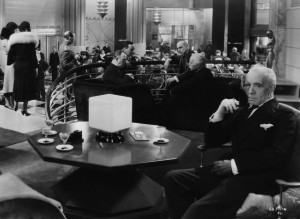
For a film adapted from a play, Grand Hotel is pretty unstagelike. I don’t want to say cinematic, because its actual outbursts of panache in that realm are scattered pretty thin—and this was the era of stylish movies. The opening—which actually was done via telephone booths and lighting onstage—is excellently done as it cuts between a series of phone conversations, each touching on one of the dramas that’s about to play out. None of this means anything to the embittered Dr. Otternchlag (Lewis Stone), a disfigured veteran of the war, who spends his days observing the people in the hotel, but is so much not a part of life, says, “Grand Hotel—people coming, going. Nothing ever happens.” Of course, much will happen in the next couple of hours, but it won’t impact or even impress him.
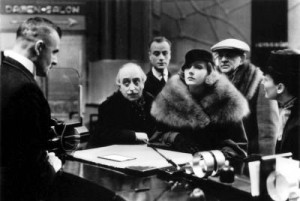
I’ve already oulined the story sufficiently and it really isn’t the story that’s the reason the film is still around and still pretty darn great. No, it’s the iconic quality of so much of it—and the one and only screen teaming of Garbo and John Barrymore. (For that matter, if you follow Garbo’s talkie career, this is so much better than anything she’d been given—it’s almost hard to believe her career survived to get here—that it’s wonderfully refreshing.) Both stars are at the peak of their powers and Barrymore hadn’t started to show the signs of his dissipation yet.
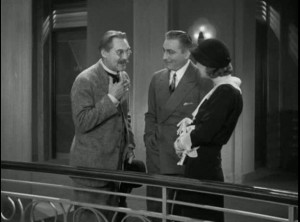
Now, I love John Barrymore. I can think of nothing I won’t watch just because he’s in it (well, The Invisible Woman and The Great Profile are pushing it). But at the same time, I’m not about to say that there weren’t occasions where you wouldn’t find him served on a kosher table. (Most great actors are that way, if you want to get honest about it.) His Baron Felix von Gaigern is not one of those performances. A friend of mine suggests it’s because he honestly respectetd Garbo, but that only accounts for his scenes with her—and he’s just as natural (restrained is not the word—thank goodness) in all his scenes. And he had to tempted to gnaw on some scenery in his scenes where his brother Lionel threatens to chew up the entire set. (Actually, it’s only the sympathetic playing of John and of—- saints preserve us—Joan Crawford that make Lionel’s character bearable. They like him, so it kind of rubs off.)
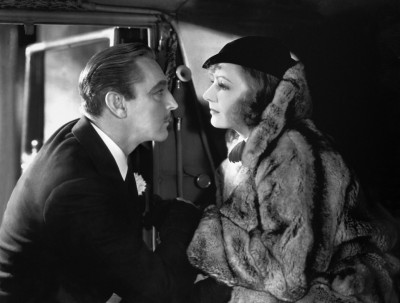
I think there was something more at work here than respect for Garbo. I truly believe that John here became the whole character because some part of him deeply identified with the Baron. When he tells Garbo that he’s the black sheep of a noble family who will “die on the gallows” it’s hard not to think that he’s really talking about himself. He certainly was the black sheep (also the most divinely talented) of an important and respected theatrical family—and by the alcohol-sodden end of his life it wouldn’t be much different from ending up on the gallows. From our perspective, his performance as a basically decent man who, gets achance at happiness and tries to reform becomes even more tragic. I suppose the same could be said of his performance in Dinner at Eight (1933), but both the character and the performance there are too mired in self-pity to ever be truly sympathetic.
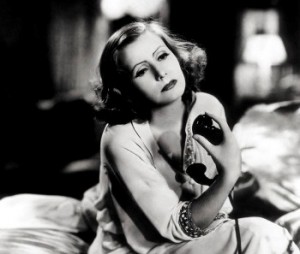
But the Garbo factor is, in any case, a strong reason for the film’s success. Really, her inexpressibly sad ballerina Grusinskaya is probably her most iconic role. It also caught her in a snare—especially with its “I want to be alone” line that followed her for the rest of her life. Audiences truly thought (and were apparently wrong) that this luminous and yet fragile and probably doomed creature really was Greta Garbo. But in a way, how could they not? Is there anything more heartbreaking than her saying, “Ring, ring, ring,” into a telephone receiver we know isn’t going to be answered? And what about, “It will be sunny in Termessos, Suzette. We’re going to have a guest”? In real life, no, she wasn’t Grusinskaya. In the world of movie icons, she was.




Before you comment
The comments section is here to provide a platform for civil dialogue on the issues we face together as a local community. Xpress is committed to offering this platform for all voices, but when the tone of the discussion gets nasty or strays off topic, we believe many people choose not to participate. Xpress editors are determined to moderate comments to ensure a constructive interchange is maintained. All comments judged not to be in keeping with the spirit of civil discourse will be removed and repeat violators will be banned. See here for our terms of service. Thank you for being part of this effort to promote respectful discussion.